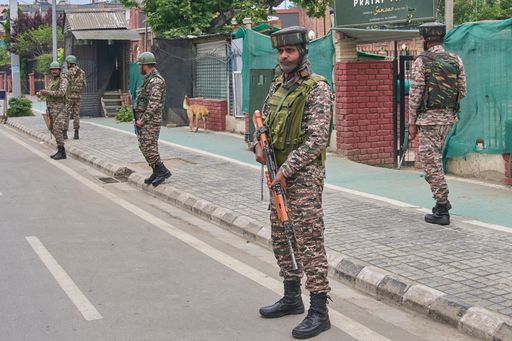Pakistani Prime Minister Shehbaz Sharif and Russian President Vladimir Putin have pledged to strengthen ties between their countries across multiple sectors, as both leaders acknowledged challenges and opportunities in their evolving partnership.
The two met in Beijing on the sidelines of the Shanghai Cooperation Organisation (SCO) summit, a gathering that brought together regional heads of state.
Putin said bilateral trade had recently declined and urged that both sides analyse the reasons and take measures to boost commerce.
"We must look into why trade turnover has fallen and take steps to remedy the situation," he told Sharif, according to Russian media.
The Russian president extended condolences over the devastating floods that struck Pakistan, adding, "We offer our heartfelt condolences to the entire Pakistani people amidst these severe calamities. We are confident that Pakistan will overcome these challenges under your leadership."
Sharif responded by highlighting recent progress, noting that Pakistan’s imports of Russian crude last year gave bilateral trade a significant boost.
"Both countries are making considerable efforts to bolster bilateral relations, particularly in commerce and trade," he said.
The Pakistani leader also underlined the significance of a trade corridor connecting Belarus, Russia, Kazakhstan, Uzbekistan, Afghanistan and Pakistan.
"This initiative will boost regional connectivity and prosperity," he said.
Both leaders reflected positively on last year’s meeting in Astana, which triggered a series of high-level exchanges and agreements.
Sharif praised Putin’s "personal commitment and interest" in improving ties, adding that Pakistan was "keen to strengthen bilateral relations further."
Since then, delegations from both countries have signed protocols covering agriculture, iron and steel, energy and transport.
In July, Moscow and Islamabad also agreed to revive and expand the Pakistan Steel Mills in Karachi, which was originally built with Russian support in the 1970s.
Sharif accepted Putin’s invitation to visit Moscow, noting it had been years since his last trip to Russia. "I am keen to return to reminisce about my formative years," he told Putin.
A balancing act in South Asia
Sharif emphasised that Pakistan respected Russia’s longstanding ties with India and wanted to build its own strong and complementary relationship with Moscow.
"We respectfully appreciate your relationship with India, it’s perfectly fine, but we’d also like to establish strong connections with you," he said.
Observers note that Pakistan’s outreach to Russia comes amid its own energy needs and desire for diversified partnerships.
Islamabad has sought discounted oil imports from Moscow and aims to expand cooperation on infrastructure projects and regional transport.
For Russia, closer ties with Pakistan offer opportunities to balance its South Asian diplomacy, which has traditionally tilted toward India, and to deepen its role in energy exports and regional connectivity initiatives.
Putin described Pakistan as "a traditional partner" and stressed that the relationship remained important.
"We cherish these ties," he said, adding that cooperation also extended to parliamentary exchanges and coordination at the United Nations, where Pakistan currently holds a non-permanent seat on the Security Council.
The meeting in Beijing was part of wider SCO diplomacy, where leaders discussed security, trade and energy.
Putin said Moscow valued Pakistan’s role in the organisation and broader regional stability.
Sharif framed the partnership as part of a regional strategy to expand economic opportunities and ensure stability.
He expressed gratitude to Russia for what he called "a balancing act in the region," suggesting Moscow’s engagement helped stabilise South Asia’s complex geopolitical environment.
Both leaders agreed to intensify efforts to enhance economic ties, despite the challenges posed by global crises and sanctions.
The talks underscored that while bilateral trade still faces hurdles, both sides are committed to strengthening ties across energy, infrastructure, agriculture and transport.
Sharif said the relationship would add to "the progress and prosperity of the region" and called Putin a "dynamic leader" whose support was central to recent progress.
Putin reiterated Russia’s optimism about Pakistan’s resilience in the face of recent crises.
He stressed the need for concrete steps to expand trade and expressed hope that upcoming high-level meetings, including the SCO Heads of Government Summit in November, would provide fresh momentum.




















